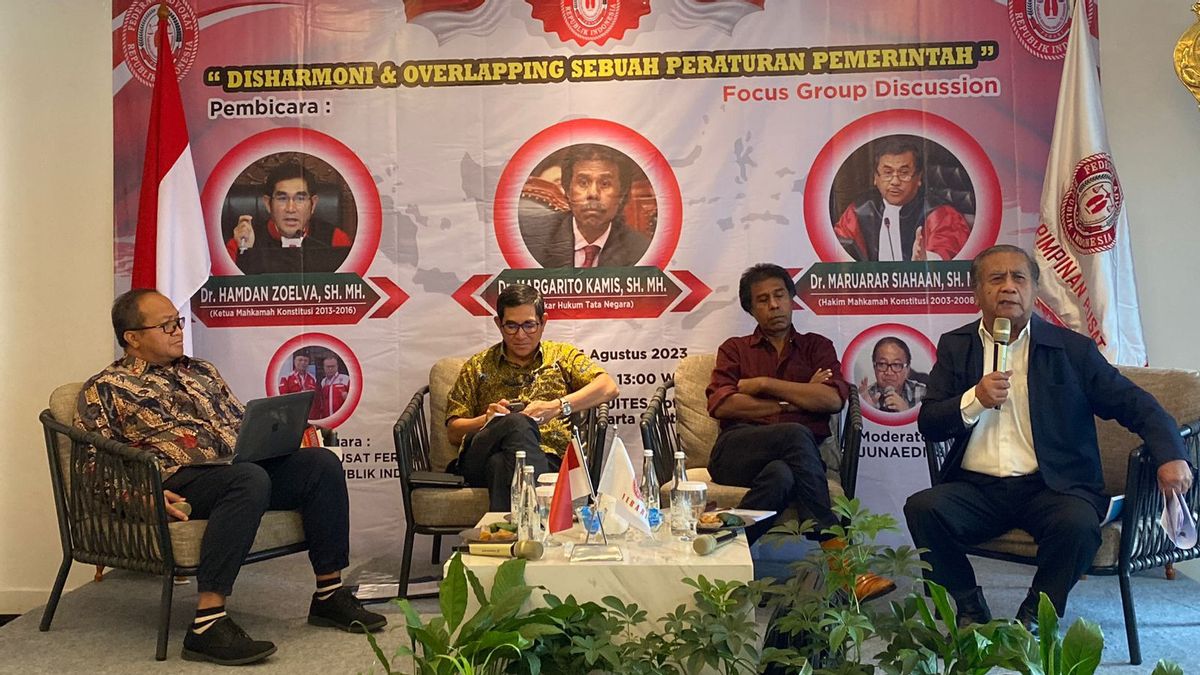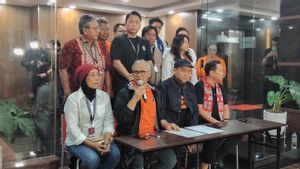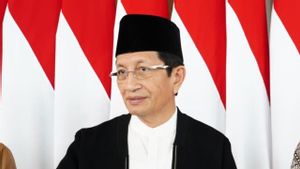JAKARTA - Former Chief Justice of the Constitutional Court (MK) Hamdan Zoelva assessed that Government Regulation (PP) Number 28 of 2022 concerning Management of State Receivables by the Committee for State Receivables was legally flawed.
According to him, the PP overlaps and is inconsistent with other legal regulations.
"There are many problems in this PP that need to be corrected. There are many norms that are contrary to the law and other regulations. Not to mention that any human rights enforcement (HAM) has been violated so that it is clear that PP Nomo2 28/2022 is against disharmonization and overlapping," Hamdan said in a written statement, Tuesday, August 22.
Hamdan conveyed this during the Focus Group Discussion (FGD) held by the Advocate Federation of the Republic of Indonesia (Ferari) entitled 'Disharmony and Overlapping of a Government Regulation' in Jakarta, Monday, August 21.
Constitutional law expert Margarito Thursday and former Constitutional Court Judge for the 2003-2008 period Maruarar Siahaan who was present at the FGD, which was moderated by political observer Ari Junaedi, also agreed with Hamdan by criticizing PP No. 28/2022. They highlighted four problems in PP No. 28/2022, namely:
1. PP Number 28/2022 contradicts and exceeds the existing regulations in Law Number 49 Prp of 1960 concerning Pantya for State Receivable Affairs.
As a delegation regulation, PP should not regulate beyond the law that delegates it, because PP is actually the implementing rule of the law. This clearly violates Article 5 paragraph (2) of the 1945 Constitution of the Republic of Indonesia which states "The President stipulates a Government Regulation to implement the law properly," he said.
2. PP Number 28/2022 is also considered to have violated the principles and basic principles of civil law as stated in the Civil Code (KUHPER).
As is known, PP No. 28/2022 contains rules that expand the subject that can be held accountable for State Receivables, not only Debt-bearing and/or Debt-guarantor but also The party that Obtains the Rights including the family in blood relations up, down, or side to the second degree, and the husband/wife.
This clearly contradicts the Civil Code, especially Articles 1338, 1315 and 1340 which basically regulates a marriage / agreement only applies to parties who make or sign it. Therefore, an agreement / agreement cannot provide profits or have an impact on losses to third parties who do not participate in making the agreement / agreement.
In addition, in civil law, it is not known that debt accountability is up to the second degree of family. In civil law, debt can only be inherited, but PP No. 28/2022 has ignored inheritance law because the heir has not died or the debt can be levyed to his heirs.
SEE ALSO:
3. PP Number 28/2022 contains rules regarding Enforcers, Civil Actions (in the form of blocking accounts, deposits etc., not being able to receive credit or other financing, not being administrators in companies etc.) and Public Service Actions (in the form of deviation, revocation of Passports, cannot get government administration services such as administering ID cards, driver's licenses, business licenses, taxation etc. This rule is heavier than criminal sanctions. Therefore, it clearly violates human rights guaranteed by the 1945 Constitution of the Republic of Indonesia. In addition, according to Article 28J of the 1945 Constitution of the Republic of Indonesia jo. Articles 70 and 73 of Law No. 39/1999 concerning Rights Restrictions as referred to can only be determined by law products.
4. Article 77 of PP Number 28/2022 also regulates the issue of impunity that regulates the decisions of state administrative officials in administering State Receivables cannot be prosecuted legally or submitted by legal remedies. This in addition to violating the Human Rights Law clearly damages the principles of the rule of law and damages law enforcement in Indonesia. This article clearly has a direct impact on Advocates as one of the Law Enforcers.
"Article 77 regarding legal remedies by debt holders, debt guarantors, parties who obtain rights or other third parties cannot be submitted against the validity or truth of State Receivables, both in court and outside, strictly violate Article 17 of the Human Rights Law concerning the Right to Obtain Justice," said Margarito.
Margarito also encouraged Ferari and other human rights activists to immediately submit a Judicial Review (JR) because the PP was very contrary to other legal regulations above it.
"Conducting a Judicial Review to the Supreme Court is a very good step to test this PP. Second, I appeal to the government that runs this PP to wisely resolve the BLBI case," he said.
The English, Chinese, Japanese, Arabic, and French versions are automatically generated by the AI. So there may still be inaccuracies in translating, please always see Indonesian as our main language. (system supported by DigitalSiber.id)


















